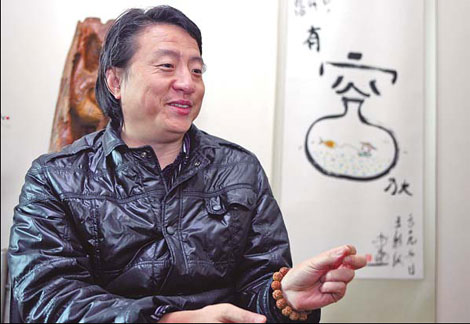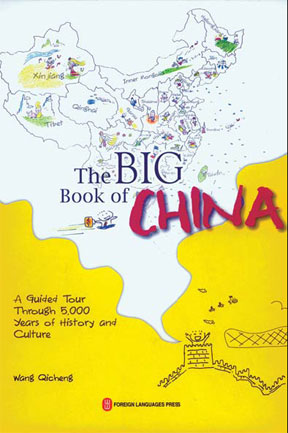Saying it in pictures

A PLA soldier swaps the gun for a brush to showcase the nation's long history and rich culture through cartoons. Chitralekha Basu and Sun Li report
As a young soldier with the People's Liberation Army (PLA) in the 1990s, Wang Qicheng never thought he would make a career out of making people laugh.
As the son of a high-ranking military officer, Wang grew up in the regimented set-up of army-provided residential quarters in Xi'an, Dunhuang, Beijing and elsewhere in China. Going to the PLA Military and Economic Institute was a given, as was joining the army at 17.
Trying to tell the story of China - a culture as ancient as it is richly-layered, as diverse as it is intractable - by drawing funny pictures was the last thing on his mind.
"It is kind of fate," says Wang, fidgeting restlessly in his Wanshuo Lu office in West Beijing, trying to dig out books, citations and photographs of his many travels across the country and the world for us to see.
He would win drawing contests as a matter of habit in school, but never thought of making art his bread and butter. The turning point came in 2002, when a friend's wife, an editor with a publishing house, asked him to produce a few illustrations for a book called Ten Thousand Styles and Sentiments. She was, evidently, delighted with the results.

One thing led to another and soon Wang was commissioned to illustrate Invitation Cards to Happiness, 2003, translated from German. His artworks began appearing regularly in the People's Daily's cartoon column. And getting recognized at the Fourth Zikai Cup Chinese Cartoon Exhibition, a national contest for cartoonists named after the legendary painter Feng Zikai, was only a matter of time.
Although Wang found his calling slightly late, when he was nudging 30, his rise and rise in the field in the past eight years is quite a story. He has put together eight odd books - exhaustive guides, presented with a lightness of touch - that stoke a reader's curiosity to find out about the defining aspects of Chinese landscape, history and culture.
He has exhibited in Frankfurt, picked up the very first Cartoon Theory Award, presented by China Artists' Association, for his thesis on documenting the nation through graphics and chaired the First China Cartoon Fair in Shouguang, Shandong province in 2010.
He has achieved it all at a relatively young 37. Wang beams his trademark endearing grin, crediting being fast-track to positions of influence in the field to the "trust and support" of his peers.
His most recent publication is The Big Book of China: A Guided Tour Through 5,000 Years of History and Culture. He spent 10 years, traversing 100,000 km across China, to put this book together, sourcing vital information, watching people and situations that only make themselves apparent to an artist's sensibilities.
Qi Qi, the book's comic protagonist, who also appeared in Wang's previous works, takes the reader by the hand, galloping uphill to the Qinghai-Tibet Plateau, sweating out the tortuous heat in Turpan, Xinjiang, in summer, wielding a huge brush to demonstrate the technique of ink-wash painting and enjoying a shower of tea (a metaphor for the soothing effect that tea boiled in Zisha teapots have on the drinker!) in Yixing, Jiangsu province.
"Qi Qi," Wang says, "is acting as a cultural ambassador, bridging the cultural gap between the West and East, a tool for popularizing Chinese history and culture."
While the breezy cartoon character with a round pate and three strands of hair is an obvious extension of the artist's own persona, Wang envisages giving him a slightly more objective role in his forthcoming series, Qi Qi's Comic Journey through Chinese Traditional Culture, which has a title each on Chinese art, customs, food, architecture and so on.
"Qi Qi can travel through space and time. He may appear in various roles or images in different books: employee, boss, farmer - someone who lived in history, a bird or a fish. He is a very flexible token," Wang says.
The Big Book of China, which has since been translated into English, French, German and Spanish, and has been a sell-out in the German and French markets, is rather ambitiously titled for a book that tries to capture 5,000 years of Chinese history in just 213 pages. Given the paucity of space, Wang says he could, at best, "try to grasp the essence and important elements in Chinese history and culture and maintain accuracy". He accumulated a small mountain of notebooks, taking down everything he heard and saw on his travels, while his assistants Hua Yan and Kong Panpan went to great lengths to ensure that the information collected was thorough and foolproof.
Besides, the editors at Foreign Language Press, his publishers, ran through the content with a fine-toothed comb. Still, the book is, by no means, complete, Wang concedes. He is happy as long as the book acts as a "key to China, arousing foreign readers' interest".
Comic China, his other work published in 2010, is very different from his earlier work. It's a fun take on Chinese culture, a satire laced with heart-tugging tenderness. For the first time, his artworks are done partially in ink and wash in the book, as opposed to line drawings.
His target audience is both Chinese and foreign. It's about "letting the world understand China, and the Chinese understand themselves". Wang believes "many Chinese know little about their own traditions and culture", and need to be made "fully aware of the nation's greatness and cultural resources".
A fan of the Taiwan-based artist Tsai Chih-chung, who is adapting abstruse spiritual ideas like Zen and Buddhism into reader-friendly comic strips, Wang too dwells at length on China's spiritual teachers - Confucius, Laozi, Zhuangzi, Zhouyi and the like. He believes philosophical ideas propagated by the ancient masters can indeed help solve modern-day problems. For example, Taoist teachings can help the acquisitive young generation reconcile with reality and not hanker after absurd goals.
His books - each one playing up China's past achievements and present glory - Wang agrees, are a manifestation of the intense nationalist pride he harbors. "The more you know about China, the more you are proud of it," he says. In fact, the country itself is like a big book, Wang adds, as there are so many lessons in its history and the teachings of ancient masters.
He is also amazed, and often touched, by the modest, gentle and reserved nature of Chinese people and their great resilience. He is deeply stirred by an old Uygur going out of his way to help him with directions, in spite of the latter's limited Mandarin; and excited to see a blind couple break out into a full-throated song on a street in Guangzhou.
It's the Chinese people and their quaint, life-affirming ways that make Wang's books so special.


















